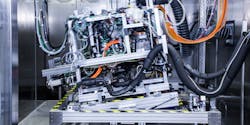Daimler Truck AG and Volvo Group announced they would join forces to develop, produce, and sell hydrogen fuel cell systems for trucks and other heavy vehicles. Daimler will allocate all of its existing fuel-cell operations into the group, including its Mercedez-Benz Fuel Cell company. Volvo has signed a non-binding agreement to acquire a 50% stake in the partnership for 600 million euros, or $650 million.
According to Daimler, successfully commercializing fuel cell technology is “key” to achieving carbon-neutral transport. Martin Lundstedt, Volvo Group CEO, said that using hydrogen to keep electric trucks moving over long distances “is one important piece of the puzzle, and a complement to battery electric vehicles and renewable fuels.”
One of the traditional drawbacks for battery-electric vehicles is their range, since they can only run on as much energy as they can carry with them in batteries and replenish via solar panels on the roof. Advanced electric passenger vehicles often have a range of approximately 200 miles, 500 miles less than many gasoline or hybrid powered vehicles.
The partnership will operate out of Daimler’s Mercedez-Benz Fuel Cell headquarters in Nabern, Germany and will run production units in Germany and Canada. According to Daimler, both companies seek to offer trucks that run on fuel cells suitable for long-haul routes by the second half of the 2020s.
The companies signaled that they expected other companies to enter the venture as well. In a statement, Daimler noted that “other automotive and non-automotive use cases are also part of the new joint venture’s scope.”
The coronavirus pandemic currently still plaguing the world economy was no obstacle to the partnership. According to Forbes, Martin Lundstedt, CEO of Volvo Trucks, the COVID-19 outbreak actually “convinced us even more that this is an area that needs continued focus.”
According to CAR, the Center for Automotive Research, the coronavirus outbreak and the subsequent hits to automobile manufacturer’s bottom lines has choked out funding for automobile research, increasing incentives for auto makers to pool their resources. According to Brett Smith, Technology Director at CAR, car and truck companies are further spurred by the addition of nontraditional auto manufacturers to the market.
“Traditionally, vehicle manufacturers knew their competitors would act similarly to themselves,” wrote Smith. During a recession, carmakers’ ability to make and research new cars would be similarly affected. But the modern car market isn’t that simple anymore. “The industry now includes many non-traditional automotive players,” says Smith, citing Waymo (owned by Google) and Tesla as examples. Both companies are diversified enough to seriously compete with more traditional automakers who might have more trouble securing funding for research.
If that’s true, then partnerships like the one between Daimler and Volvo may become the near-future norm for vehicle manufacturers invested in researching future vehicle technology.
About the Author
Ryan Secard
Associate Editor
Ryan Secard joined Endeavor B2B in 2020 as a news editor for IndustryWeek. He currently contributes to IW, American Machinist, Foundry Management & Technology, and Plant Services on breaking manufacturing news, new products, plant openings and closures, and labor issues in manufacturing.
